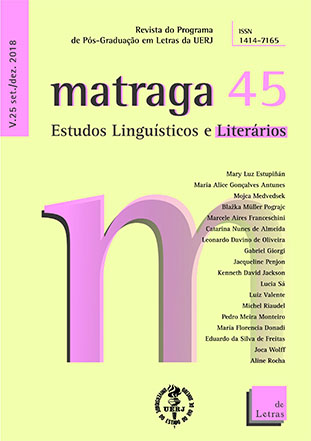“Uma mulher que nunca vergava; que não tinha amo nem Deus” – recortes da mítica rainha Nzinga na literatura de Agualusa, Mussa e Eugénia Neto
DOI:
https://doi.org/10.12957/matraga.2018.37037Palavras-chave:
Rainha Ginga, Agualusa, Mussa, Eugénia Neto.Resumo
A mítica Nzinga Mbandi, a Rainha Ginga, foi líder de vastíssimo território no século XVIII. Grande parte dos escravizados que vieram ao Brasil são oriundos da região bantu – dominada por ela então. Sua história é tão gloriosa quanto a da própria África. Não por acaso inúmeros são os historiadores que se interessam por sua figura, assim como centenas são os escritores que já se aventuraram a romancear ou a cantar seus feitos. Para essa análise, escolheram-se três autores: o angolano José Eduardo Agualusa e seu romance histórico A Rainha Ginga: e de como os africanos inventaram o mundo (2014); o carioca Alberto Mussa e seu romance policial O trono da Rainha Jinga, (1999); e a portuguesa radicada em Angola Eugénia Neto e seu poema “Poema à Mãe Angolana”, lançado em 1976, no contexto da luta pela Independência de Angola. Prezaram-se, nesse estudo, dois movimentos: primeiramente, descreveu-se historicamente a figura da Rainha para então a retratar segundo recortes dos autores supracitados. Ambos Agualusa e Mussa tendem a demonstrar o poder da Rainha representado por sua força “de macho”, já que a líder assume a governança marcada pela linhagem patriarcal. Já Eugénia Neto humaniza a figura de Nzinga como a grande “Mãe Angolana”, salientando suas características femininas. Independente do julgamento, importa perceber como autores de distintas nacionalidades e gêneros constroem a imagem da soberana africana, mesclando história e ficção num balé fértil de dimensões épicas e poéticas.
Downloads
Downloads
Publicado
Como Citar
Edição
Seção
Licença
AUTORIZAÇÃO
A Matraga – Revista do Programa de Pós-Graduação em Letras da UERJ está autorizada a publicar o artigo ora submetido, caso seja aceito para publicação online. Fica atestado que a contribuição é original, que não está sendo submetida a outro editor para publicação, e que a presente declaração é a expressão da verdade.
Os trabalhos publicados no espaço virtual da Matraga – Revista do Programa de Pós-Graduação em Letras da UERJ serão automaticamente cedidos, ficando os seus direitos autorais reservados à Matraga. Sua reprodução, total ou parcial, é condicionada à citação dos autores e dos dados da publicação.

A Matraga utiliza uma Licença Creative Commons - Atribuição-NãoComercial 4.0 Internacional.





